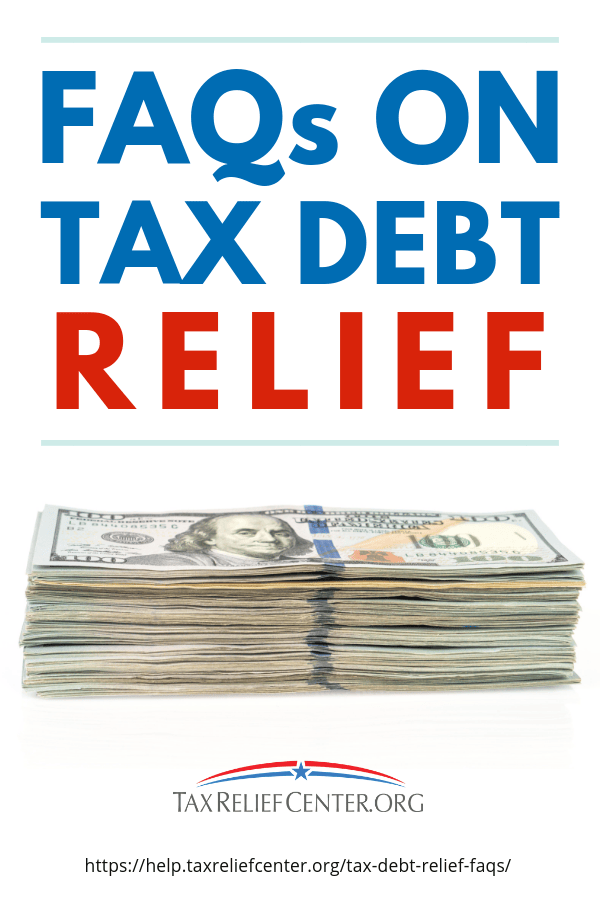Millions of Americans struggle to make ends meet and pay their rightful taxes at the same time. Good thing there are tax debt relief programs available.
In this article:
- Tax Debt Relief Programs Are Available
- What Is Tax Debt Relief?
- What Are the Potential Consequences of Owing the IRS Back Taxes?
- How Do IRS Payment Plans Work?
- What Is an Offer in Compromise?
- What Happens If the IRS Deems Your Account “Currently Not Collectible?”
- What If Paying Your Back Taxes Causes Undue Hardship?
- Can You Obtain Tax Debt Relief on Your Own or Should You Seek Professional Help?
Tax Debt Relief | Things You Need to Know
Tax Debt Relief Programs Are Available
Many people look forward to tax time, anticipating a refund that can fund a big purchase or help pay down credit card debt. However, if you’re one of the many who ends up owing money come April 15th, the IRS tax deadline can cause anxiety and stress instead.
If you find yourself in the position of not being able to pay your tax bill or you’re still behind on your back taxes from previous years, this burden can feel crushing.
Luckily, there are IRS tax debt programs that can help ease this financial strain and offer some debt forgiveness. Here’s what you should know about IRS tax debt relief.
What Is Tax Debt Relief?
It is the partial cancellation of tax owed or an extension of a payment deadline to provide assistance to those struggling financially.
In short, the IRS offers several different types of tax debt relief programs you may be able to qualify for if you aren’t able to pay your taxes this year or still owe from prior years.
The most common forms of tax relief offered by the IRS are payment plans and offer in compromise settlements. You may also be able to temporarily delay the collection of your owed taxes.
What Are the Potential Consequences of Owing the IRS Back Taxes?
Taking advantage of any tax debt relief you qualify for is so critical because the consequences for not paying your tax debt can be severe.
The IRS automatically charges a 0.5% penalty each month (or part thereof) you’re late paying in addition to interest. Over time, this penalty can rise to 25% of your unpaid tax bill.
The IRS also has the power to put a lien on any property you own, to garnish your wages, and to ultimately seize and sell your property to pay back the taxes you owe.
How Do IRS Payment Plans Work?
An installment agreement is the most common form of IRS payment plan.
If you owe less than $50,000 in back taxes, you can apply for a monthly installment agreement online. Otherwise, you need to fill out and send in Form 9465 to the IRS.
Such installment agreements allow you to pay off your tax bill over time with monthly payments for as long as 72 months. You can pay via direct bank debit, check, money order, payroll deduction, or credit card.
An installment agreement costs $120 to set up (reduced to $52 if you opt for direct debit). Keep in mind that you will continue to pay penalties and interest on your remaining tax debt while on an installment plan.
The other payment plan option that the IRS offers is a short-term extension agreement. This is perfect for taxpayers who need a little extra time to pay in full.
You can qualify if you owe less than $100,000 and can pay your full tax bill within 120 days. There’s no fee for choosing this option.
RELATED: Tax Relief For Natural Disaster Victims
What Is an Offer in Compromise?
For some taxpayers, paying off their full tax debt isn’t possible, even with a 72-month installment agreement.
In such cases, the IRS has an offer in compromise program that can allow you to settle any back taxes for less than the total amount owed. You must be able to pay back the amount offered immediately.
An offer in compromise cannot be combined with an installment agreement.
The IRS does recommend that taxpayers look at other payment options prior to seeking an offer in compromise.
In general, your offer will be turned down if you are found to be able to fulfill your full tax obligation via a short-term extension or installment plan. The IRS looks at your ability to pay, your income, your expenses, and your asset equity when assessing your offer in compromise.
What Happens If the IRS Deems Your Account “Currently Not Collectible?”
Even an offer in compromise may not be feasible for certain individuals.
If the IRS finds that you cannot pay any portion of the taxes you owe, they can declare you “currently not collectible.” This means that the IRS will delay its attempts to collect your back taxes temporarily to give you time to improve your financial situation.
The amount you owe will not be reduced and you will continue to accrue interest and penalties. However, this delay can give you time to get in a better financial position before applying for a payment plan or offer in compromise.
You need to request such a delay in collection by calling the IRS and submitting a Collection Information Statement and proof of your current financial status.
The IRS may still file a tax lien against your assets during the delayed collection period.
What If Paying Your Back Taxes Causes Undue Hardship?
In limited cases, you may qualify for a payment extension and have any late penalties you would otherwise incur waived.
This occurs when the IRS deems that it would cause “undue hardship” if you were asked to pay your taxes by the normal due date.
What qualifies as an undue hardship? As an example, needing to sell your home at a loss in order to cover your tax bill can be deemed an undue hardship.
To apply, you need to provide the IRS with Form 1127 as well as a detailed explanation for your undue hardship.
Approved taxpayers are offered an additional six months to pay owed back taxes or as much as 18 months to pay back tax deficiencies uncovered after the IRS reviews your return.
Can You Obtain Tax Debt Relief on Your Own or Should You Seek Professional Help?
You certainly can obtain tax debt relief on your own. In certain cases (such as setting up a monthly installment agreement if you owe less than $50,000), it’s possible to secure tax relief online.
In more complex cases, the IRS accepts the required forms and backup materials directly from you without the assistance of a professional.
Keep in mind, however, that understanding and navigating all of the bureaucratic steps needed to successfully obtain tax debt relief can be challenging for someone without experience dealing with the IRS.
That’s why your best chance for setting up a workable installment agreement or achieving substantial debt forgiveness is often with the help of a qualified tax professional.
Have you at any point applied for any form of tax debt relief from the IRS? Tell us about your experiences in the comments section below.
Up Next: 9 Tax Relief Tips You Can Do When You’re In Tax Trouble



